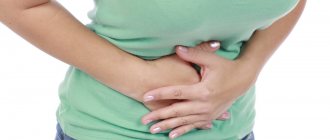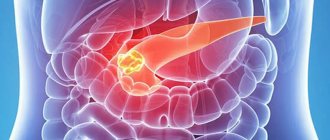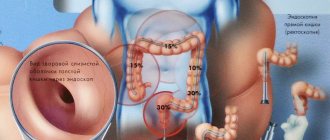Constipation is a very delicate problem. It is not customary to discuss it with friends and relatives. But according to statistics, about 15% of the world's inhabitants suffer from chronic defecation retention. Pathology not only causes discomfort, but also harms health.
Toxins present in feces penetrate into the blood and spread throughout the body. As a result, symptoms of intoxication appear. To avoid such complications, constipation should be treated without delay.
It is worth noting that chronic constipation is a functional disease. Diagnostics plays a special role in choosing the right treatment tactics, so it is often difficult to do without the help of a doctor, especially if we are talking about a serious defecation disorder.
In some cases, the causes of constipation are known to a person, and correction of the condition is not difficult; in others, treatment of the underlying pathology and special measures will be required. In the article we will look at the main causes of constipation and ways to get rid of the disease.
What is chronic constipation?
Everyone experiences constipation at some point. In most cases, constipation is short-lived, often occurs after a change in diet, and can be treated with medications. In more rare cases, constipation can be chronic, meaning its symptoms last longer. Doctors consider constipation chronic if it:
- lasts more than 3 months
- disrupts a person's life and daily functioning
- does not go away after changing diet
- Only medicines help
Sources
- Parfenov A.I. “Constipation: from symptom to disease” Consilium Medicum. Volume 05, No. 12, 2003
- Privorotsky V. F., Luppova N. E. Modern approaches to the treatment of functional constipation in children. RZHGGK. - 2009. - T.19. - No. 1. - P.59-65.
- What is Constipation? WebMD, 2019
- Adam Felman “What to know about constipation.” MedicalNewsToday, 2021.
- Iovino P., Chiarioni G., Bilancio G., Cirillo M., Mekjavic IB, et al. (2013) New Onset of Constipation during Long-Term Physical Inactivity: A Proof-of-Concept Study on the Immobility-Induced Bowel Changes. PLOS ONE 8(8)
- Colorectal cancer. The Royal Marsden
- Danielle Moores "What You Should Know About Constipation." Healthline. 2019
- Magro DO, de Oliveira LM, Bernasconi I, Ruela Mde S, Credidio L, Barcelos IK, Leal RF, Ayrizono Mde L., Fagundes JJ, Teixeira L. de B., Ouwehand AC, Coy CS Effect of yogurt containing polydextrose, Lactobacillus acidophilus NCFM and Bifidobacterium lactis HN019: a randomized, double-blind, controlled study in chronic constipation. Nutr. J. 2014 Jul 24;13:75.
Chronic constipation - symptoms
Chronic constipation causes the following symptoms over a 3-month period:
- Bowel movements less than three times a week
- Stool is hard and lumpy
- Having to strain to empty your bowels
- Feeling that the rectum is not completely empty after bowel movements
- Feeling of blockage in the rectum
Secondary symptoms of chronic constipation include:
- Bloating
- Nausea
- Abdominal pain
- Loss of appetite
Risks of vascular damage due to constipation
One of the most common complications of prolonged constipation is hemorrhoids. It represents inflammation, thrombosis and excessive dilation of the venous vessels located in the rectal area. It manifests itself as pain in the anus, bleeding and prolapse of hemorrhoids (Fig. 2).
Figure 2. Stages of development of hemorrhoids. Source: CC0 Public Domain
The basis for the development of hemorrhoids during constipation is direct damage to the blood vessels by dry feces and excessive straining necessary for defecation in this disorder. Also, these two disorders have common provoking factors, which increases the risk of injury to local veins.
Chronic constipation - causes
The causes of chronic constipation can be different. The most common causes of constipation include:
- slow peristalsis of the large intestine
- unbalanced diet with insufficient fiber from fruits and vegetables
- insufficient fluid intake
- lack of exercise, which slows digestion
- irritable bowel syndrome
- side effects of medications
- mental health problems, including: stress
- anxiety
- depression
- eating disorders
Less common causes of constipation:
- hormonal imbalances such as hyperthyroidism
- conditions affecting metabolism, such as diabetes
- disorders affecting the brain and spine, such as Parkinson's disease
- celiac disease
- inflammation associated with diverticular disease or proctitis
- obstruction of the intestine or rectum
- family history of constipation
Other reasons
Some dietary supplements and medications can also cause constipation. These include:
- iron supplements
- calcium supplements
- antacids
- diuretics
- antihistamines
- calcium channel blockers
- some antidepressants
- antipsychotics
- anticonvulsants for the treatment of Parkinson's disease
Unknown reasons
It is not always possible to determine what is causing constipation. Chronic constipation that occurs without a known trigger is known as chronic idiopathic constipation.
What problems can constipation cause?
Despite significant discomfort, isolated episodes of defecation disorders are not dangerous. However, chronic constipation can be a provoking factor for a number of diseases and disorders, including:
- Fecal impaction is the accumulation of dry stool in the final intestine that cannot be passed without additional intervention.
- Rectal bleeding and anal fissures associated with rupture of the soft tissues of the rectum and anal sphincter.
- Proctosigmoiditis is inflammation of the mucous membrane of the rectum and sigmoid colon.
- General decrease in quality of life and depression [5].
- Damage to the blood vessels of the rectum.
Constipation can act as one of the primary symptoms of more dangerous intestinal diseases, for example, colorectal cancer.
“Colon cancer has gotten younger. In St. Petersburg, colorectal cancer is the leader among cancer diseases: in 2010, 2,700 new cases were identified, in 2015, 3,654 cases were identified. The most important organ for eliminating toxic and carcinogenic substances suffers because attention is not paid to functional constipation. Indoles, phenols, skatole, cadaverine (cadaverine) should be released every day. In addition, constipation increases the risk of inflammatory diseases, Crohn’s disease, ulcerative colitis, diverticulosis, and hemorrhoids.” Konstantin Aleksandrovich Shemerovsky, Doctor of Medical Sciences, Prof., Head of the Department of Physiology of Visceral Systems named after. K.M. Bykov Institute of Experimental Medicine (St. Petersburg)
Chronic constipation - treatment
Treatment for chronic constipation depends on its severity and the underlying cause.
Possible treatments
Diet and lifestyle changes
The first line of treatment for chronic constipation is to make changes to your diet and lifestyle.
Increasing fiber intake
Dietary fiber adds bulk to stool, allowing it to pass through the intestines more quickly. Your doctor may recommend gradually increasing your fiber intake by introducing more fruits and vegetables into your diet. Switching from refined grains to whole grains can increase your fiber intake.
Drink more water
Water softens the stool, allowing it to pass smoothly through the intestines and rectum.
Increasing physical activity
Regular movement increases muscle activity in the intestines, helping stool pass through the digestive system. Therefore, increasing physical activity promotes more regular bowel movements.
Go to the toilet when the urge arises
If a person regularly ignores their body's signals, they may not feel the urge to have a bowel movement, which can make constipation worse.
Medicines
If diet and lifestyle changes are not effective, medications can be tried to soften the stool or increase bowel movements. Some methods include:
- Fiber supplements such as psyllium, which adds bulk to stool
- Stool softeners such as Surfak, which draw water from the intestines to moisten stool
- Oils such as olive help to have bowel movements smoothly
- Stimulants such as Senokot cause bowel movements
- Enemas and suppositories to facilitate bowel movements
- If over-the-counter laxatives and natural remedies do not relieve constipation, your doctor may recommend prescription medications. The drugs lubiprostone (Amitiza) and linaclotide (Linzes) are usually effective in treating chronic constipation.
Biofeedback training
Biofeedback training is a type of behavioral therapy aimed at treating constipation and other types of bowel dysfunction. This type of therapy involves learning how to relax and tighten the pelvic muscles that support the bladder and bowels. Relaxing these muscles at the right time can increase the likelihood of a successful bowel movement.
During biofeedback training, the therapist will walk you through a series of exercises to help you relax and tighten your muscles. A 2006 study compared the effectiveness of biofeedback training and laxative medications in people with pelvic floor problems. The researchers found that the training was more effective.
Surgery
Surgery for chronic constipation is rare. However, a person may need surgery to remove a blockage in the intestine or part of the diseased colon.
Constipation as a symptom of cancer
Malignant tumors of the gastrointestinal tract develop for a long time without obvious symptoms. Constipation is often one of the early manifestations of cancer.
This symptom is caused by mechanical blocking of the intestinal lumen by the tumor, which complicates the passage of feces through the intestinal sections. It can also be a side effect of ongoing chemotherapy.
Other possible clinical signs of gastrointestinal cancer include:
- Loss of body weight without changes in diet.
- The appearance of blood impurities in the stool.
- Chronic weakness and malaise, headaches.
It is also believed that constipation caused by other reasons may increase the risk of developing malignant tumors due to the content of carcinogens in the feces.
Constipation in colon cancer
The most common symptom of a malignant tumor of the colon is a violation of bowel movements. In this case, both an intensification of an existing disorder and alternating attacks of constipation and diarrhea can be observed. Patients also experience pain in the area of the tumor, and there may be fresh, unchanged blood or mucus in the stool [6].
Constipation in colorectal cancer
When the tumor is localized in the rectal area, possible symptoms, in addition to constipation and other signs of colon cancer, are the sensation of an empty bowel. Because of this, the patient experiences severe discomfort and a constant urge to defecate [6].
Constipation in stomach cancer
In case of malignant tumors of the stomach, constipation most often occurs as a consequence of impaired intestinal motility (paresis) as a result of chemotherapy.
Clinical manifestations of stomach cancer are similar to those of colorectal cancer: pain in the abdomen, alternating constipation with diarrhea, weight loss, general weakness. In this case, feces most often acquire a dark brown or black color due to the reaction of the blood with hydrochloric acid.
In advanced stages of cancer, the tumor may block the lumen of the outlet connecting the stomach and duodenum. As a result, food stops getting into the intestines, which causes stool retention. Clinically, this is manifested by vomiting of partially digested food a short period of time after eating.
Vomiting after eating, along with constipation, may be evidence of stomach cancer. Photo: jcomp - ru.freepik.com
Why does constipation develop and what to do?
We relied on the classification of the famous American gastroenterologist Yamada T., but clarified the first item on his list, since the medical term “idiopathic constipation” would mean something abusive for most. According to encyclopedic data, the main causes of chronic constipation are:
1. The most common reason is poor nutrition.
A deficiency of fiber (vegetables, cereals) and an excess of fatty, sugary, dairy, and meat foods always causes stool disorders. Even if you don’t have enough time to eat healthy, no one bothers you to at least simply reduce the harmful ones and add healthy ones. Practice shows that giving up flour for a month and cutting meat by half can help most. But there are people who eat a lot of vegetables and still have toilet problems. Because their intestines are atonic and increasing fiber alone does not work.
For such cases, natural complexes from the Sokolinsky System are best suited. NutriDetox (psyllium fiber + chlorella and spirulina) directly affects the intestines, improves the structure of bile and thereby supports enzymes - Zyflanium and for the tone of the intestinal wall, along with antiparasitic and anti-inflammatory effects, you can add Curcuminum Q10 complex. This not only produces a laxative effect, but also triggers restoration processes in the intestinal wall.
The basis of NutriDetox is psyllium fiber, which is a “world hit” in cleansing the intestines. But we have a trick that allows us to succeed even with those who have been suffering from bowel dysfunction for a long time and ordinary psyllium did not help them. This subtlety lies in the use of the “intestines + liver” complex to not only mechanically cleanse, but also influence the causes.
#NutriDetox 175 gr
100% food product for deep cleansing and nutrition correction of the body at home.
More details
2. When there are mechanical obstacles.
Here the possibility of self-regulation and getting rid of the problem on your own is not so great. Although the same program that is written above can be used for diverticulosis, endometriosis, and adhesions. In case of acute obstruction, if there has been no stool for several days and there is abdominal pain, then the only treatment is “ambulance”
Colorectal tumors may interfere; adhesions (for example, with diverticulitis, with inflammatory bowel diseases); endometriosis; anal fissures or hemorrhoids. Here we also commonly use the wide range of benefits of turmeric extract - Curcuminum Q10 complex.
3. When there is a violation of nervous regulation.
Dysregulation of the tone of the colon and rectum causes multiple sclerosis; spinal cord lesions; Parkinson's disease; scleroderma; amyloidosis; polymyositis/dermatomyositis; myotonic dystrophy. It is clear that treatment of the underlying disease is necessary.
4. When there are hormonal changes
Diabetes; excess calcium in the blood; decreased thyroid function; potassium deficiency and even pregnancy. We influence the underlying disease.
5. When certain medications are taken or there is chronic poisoning
Tricyclic antidepressants; antipsychotic; antiparkinsonian; hypotensive; ganglion blockers; anticonvulsants; calcium channel antagonists; iron supplements; aluminum-containing antacids; calcium preparations; barium sulfate; there is heavy metal poisoning (arsenic, mercury, lead).
Abnormal bowel movements in themselves cause the accumulation of toxic substances in the body. Therefore, with long-term constipation, it makes sense to get tested for toxic trace elements. This may be the solution to the problem.
6. When there are psychological problems
For example, a person feels uncomfortable going to the toilet when he is not at home or when conditions do not allow him to go to the toilet calmly and comfortably. This happens especially often in children and women.
When Constipation Can Be Deadly
A tumor in the large intestine, whether benign or malignant, can interfere with the passage of stool. At first, when the intestine is not yet completely blocked, it causes a feeling of bloating. If you do not seek help in such a situation, the tumor may completely block the intestinal lumen, and then acute intestinal obstruction occurs. This situation requires emergency surgery. Unfortunately, the effectiveness of such an operation is often quite low. If the intestine swells very much in front of the narrowing site, it may rupture. In this case, the stool enters the abdominal cavity, and the likelihood of death in such a situation is very high.
Program to support proper digestion.
Simultaneous restoration of proper functioning at the level of the liver and intestines, including a reboot of the microflora.
Here you can read about the composition, mechanism of action, why we consider this combination correct for getting rid of constipation, how it affects the causes.
How to normalize digestion and thereby improve overall health
You can normalize digestion: the functioning of the stomach, intestines, liver, pancreas, microflora. And live more peacefully!
If you understand how these organs are connected to each other.
Download V. Sokolinsky's book for free. This system has helped thousands of people around the world!
read 370,426 times
What will happen if this problem is not solved?
The most rapid and obvious complications include: hemorrhoids, anal fissures, rectal prolapse.
The overall effect of fecal retention is on a decrease in the level of immunity, the manifestation of allergies, impaired absorption of vitamins and minerals, causes depression and aggravates neurotic conditions, chronic fatigue syndrome.
According to Moscow researchers at the Central Research Institute of Gastroenterology, the incidence of colorectal cancer and polyps in patients suffering from constipation is 4.5 and 10.8%, respectively, colon diverticulosis (a disease when pockets form in the mucous membrane, where food rots, causing inflammation) - 16.2%, diseases of the anorectal area (hemorrhoids, anal fissures, rectocele) - 70.2%, functional diseases (irritable bowel syndrome) - 16.2%.
#Digestive support program
Self-regulation of digestion. Continuation of the course of cleansing, restoration of microflora, increase in energy levels for 2-3 months
More details
How to avoid constipation
First of all, you need to eat right. Your diet should have enough fiber from vegetables and fruits. But there should not be too much fruit, since they contain a lot of glucose, and it can cause fermentation in the intestines and, accordingly, excessive formation of gases. But vegetables such as zucchini, cabbage and bell peppers can be eaten in almost unlimited quantities: the plant fiber contained in them is not digested and does not serve as a source of energy for our body. It serves as a good breeding ground for beneficial bacteria, which multiply well in such conditions and, in turn, also contribute to the proper digestion of food and the formation of soft stools. Fiber fiber, like a sponge, retains water and plays the role of a frame on which food debris sticks, forming soft, loose stool.
Article on the topic
Microbes rule us. How microorganisms in the intestines make us sick It is useful to drink at least two liters of water a day. But this advice is not suitable for those who have heart or kidney disease; they need to reduce the amount of fluid. In such cases, you should definitely consult a doctor.
Physical activity is very important to prevent constipation. The movement of skeletal muscles contributes to the good functioning of the muscles of internal organs, including the colon. The World Health Organization recommends moving for at least 30 minutes a day. For those who move a lot and exercise at least 3-4 times a week, the colon works more actively, and this is a good prevention of constipation.
Some people require large amounts of not only vegetables, but also preparations with plant fiber to prevent constipation. Most often they contain flax seed powder. It is good to dilute it with water and drink it in the morning, thanks to this the body will receive a sufficient amount of indigestible coarse plant fiber. You can also take bran - wheat, rye or oat. Their usual dose is 2 tablespoons. To make the bran swell, it is good to brew it with boiling water, pour it with water overnight, or dilute it with yogurt. And you can eat it instead of porridge or eat it with porridge for breakfast. Preparations made from microcrystalline cellulose are also used. It's not fiber, but it works in a similar way. As for laxative medications, it is better to take them not on your own, but as prescribed by a doctor.











